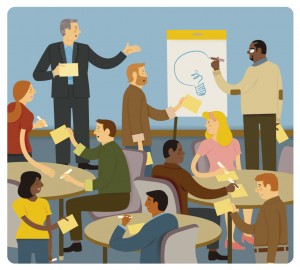 Every year the Firm pauses for a half day to engage in professional training and reflection. We do this because we strive to improve the ways we serve our clients, our co-workers, our families, our friends, as well as with anyone we may come into contact in our daily lives.
Every year the Firm pauses for a half day to engage in professional training and reflection. We do this because we strive to improve the ways we serve our clients, our co-workers, our families, our friends, as well as with anyone we may come into contact in our daily lives.
This year we invited James Drennan, an attorney and experienced trainer to those in the legal profession including judges and law enforcement personnel, to teach us about implicit bias. “Fairness” is a basic standard we all deserve and expect but sometimes don’t get. Frequently people make decisions based on their own biases that don’t always have the fairest outcomes. For an illustration on how fairness or unfairness affects behavior click here.
Consider the recent example of Dr. Fatima Cody Stanford, a doctor at Massachusetts General Hospital and instructor at Harvard Medical School. She was on a flight from Indianapolis to Boston when a woman next to her began showing signs of distress. When she did as she was trained and started assisting the woman as a trained doctor, flight attendants stopped her and asked if she really was qualified to help the woman. Dr. Stanford did stop treating the woman to show the flight attendant her medical license clearly showing the letter “M.D.” after her name. Dr. Stanford is a black woman. The flight attendants continued to question her credibility. It was hard for them to believe a woman, a black woman could be a doctor when their implicit bias likely unconsciously told them a doctor should be a white male. Read the New York Times story here. This is one of many examples on how implicit bias affects decision-making everyday. As a Firm we want to be sure we are minimizing these kinds of knee jerk decisions with the people in our lives.
What is Implicit Bias?
“Also known as implicit social cognition, implicit bias refers to the attitudes or stereotypes that affect our understanding, actions, and decisions in an unconscious manner. These biases, which encompass both favorable and unfavorable assessments, are activated involuntarily and without an individual’s awareness or intentional control. Residing deep in the subconscious, these biases are different from known biases that individuals may choose to conceal for the purposes of social and/or political correctness. Rather, implicit biases are not accessible through introspection.
The implicit associations we harbor in our subconscious cause us to have feelings and attitudes about other people based on characteristics such as race, ethnicity, age, and appearance. These associations develop over the course of a lifetime beginning at a very early age through exposure to direct and indirect messages. In addition to early life experiences, the media and news programming are often-cited origins of implicit associations.
A Few Key Characteristics of Implicit Biases
Implicit biases are pervasive. Everyone possesses them, even people with avowed commitments to impartiality such as judges.
Implicit and explicit biases are related but distinct mental constructs. They are not mutually exclusive and may even reinforce each other.
The implicit associations we hold do not necessarily align with our declared beliefs or even reflect stances we would explicitly endorse.
We generally tend to hold implicit biases that favor our own ingroup, though research has shown that we can still hold implicit biases against our ingroup.
Implicit biases are malleable. Our brains are incredibly complex, and the implicit associations that we have formed can be gradually unlearned through a variety of debiasing techniques.”
Source: http://kirwaninstitute.osu.edu/research/understanding-implicit-bias/
While it is virtually impossible to rid yourself of implicit bias completely, it is possible to train yourself to make better decisions. To strive to do better so that you are more consistently creating a sense of fairness with the people around you.
A test is available where you can measure your implicit bias on a range of subjects including race, age, disability, gender, race, religion, and many more. A Warning: These tests will challenge who you think you are and can potentially upset you. You may not believe the results or they may ring true. “If you are unprepared to encounter interpretations that you might find objectionable, please do not proceed further.”
Source:https://implicit.harvard.edu/implicit/takeatest.html
The tests are here.